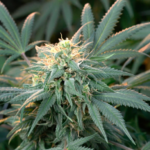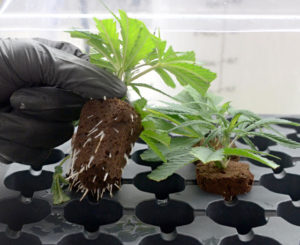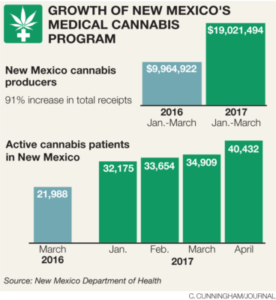
By Olivier Uyttebrouck / Albuquerque Journal
Published on May 15, 2017
New Mexico’s medical cannabis industry has grown into a powerful magnet for money and customers.
Customers, sales revenue and dispensaries have exploded the past year with a total of more than 40,000 people now signed up to purchase medical marijuana.
Since Jan. 1, some 8,000 New Mexicans obtained a state-issued license that allows them to legally buy pot, pushing patient enrollment to 40,432 in April. With the recent growth spurt, enrollment has increased by 84 percent since March 2016.
The number of dispensaries increased from 36 in January 2016 to 56 in April, with new dispensaries popping up in smaller cities, such as Roswell, Hobbs, Clovis, Carlsbad, Artesia and Taos.
And that has helped fuel an impressive sales growth over the past year.
First quarter sales this year topped $19 million, up 91 percent over the same period in 2016, according to New Mexico Department of Health data.
“We are probably the single fastest growing industry in New Mexico,” said Duke Rodriguez, president and CEO of Ultra Health LLC, the state’s largest cannabis distributor. “This is the one industry that has been a juggernaut of growth.”
Rodriguez and others say a key reason for the rapid growth is greater acceptance of cannabis, in New Mexico and nationally, among the public, and by physicians who certify patients.
“Cannabis is being mainstreamed,” Rodriguez said. “Patients are coming out into the bright daylight and saying they advocate and support cannabis. No longer is it a hush-hush topic.”
But the growth of medical cannabis doesn’t sit well with everyone.
State Rep. Bill Rehm, an Albuquerque Republican and a retired sheriff’s deputy, worries that legalizing cannabis would worsen the state’s problem with driving under the influence. He also rejects that legalization would eliminate the criminal market for pot.
Lawmakers this year killed a bill sponsored by Rehm that would have expanded the state’s drunken-driving law to include blood concentration levels for marijuana and other drugs.
Demand outruns supply
The industry has used new forms of marketing, including Facebook and other kinds of social media to promote events such as “hemp expos” or fairs where people can learn how to qualify for a patient’s license. For example, the Weekly Alibi and a variety of growers and businesses will sponsor New Mexico Hempfest 2017 on Aug. 17 at Albuquerque’s Balloon Fiesta Park.
“We have a huge social media presence,” said Willie Ford, managing director of R. Greenleaf & Associates, a management company that oversees four state-licensed marijuana producers. “The people that we’re trying to reach tend to be in the alternative medias.”
Ford advertises in publications that specialize in alternative therapies and holistic medicine. He also speaks on radio shows and at other events to promoting the concept that cannabis offers a natural alternative to pharmaceutical drugs.
“Any chance I get to go out there and preach the word, I do,” he said.
Rehm said the program’s growth suggests that many people are getting medical cannabis cards for purposes other than medical relief.
“I think that it’s being abused,” he said Friday. “I think there are a bunch of people who are obtaining marijuana cards, not for a true medical reason, but for justification for them to smoke marijuana legally.”
Ford responded that the vast majority of patients want cannabis for legitimate medical reasons, but acknowledged that some “have gamed the system to get a card.”

“I have put my full faith in the Department of Health,” Ford said. “They have a good system for determining and confirming a person’s eligibility.”
The health department’s application process requires patients to provide documentation from a physician supporting a medical diagnosis for a qualifying condition.
The heavy demand led to processing delays last year at the state Department of Health, which manages the program. By June 2016, average processing time increased to 60 days, exceeding the 30-day limit set by state law.
Kenny Vigil, who manages the DOH program, said the agency now has eight employees who handle patient applications, and processing time has been cut to less than 30 days.
Big business
Medical cannabis is turning into big business.
In 2015, none of New Mexico cannabis producers had total receipts that exceeded $1 million. This year, five growers topped $1 million in sales from January through March, alone.
Topping the list is Ultra Health, which reported $1.96 million in sales in the first quarter, followed by R. Greenleaf Organics with $1.76 million for the period.
Others in the $1 million first-quarter sales club include: Verdes Foundation, $1.4 million; New MexiCann, $1.09 million; and Minerva Canna Group, $1.08 million. Those five account for 38 percent of total receipts among the 35 nonprofit producers licensed by the state health department to grow and sell medical marijuana.
In all, producers had 11,565 plants in production in the fourth quarter of 2016, up from 5,379 plants in the fourth quarter of 2015, state records show.
The health department in 2015 increased the maximum number of plants producers can grow to 450, up from the previous cap of 150.
The agency has also expanded to 21 the number of medical conditions that allow patients to qualify for medical cannabis, up from seven listed in the 2007 law. Post-traumatic stress disorder, added in 2010, has allowed some 17,000 patients to qualify for a card.
Producers have also tapped new markets by starting dispensaries in communities where cannabis was previously unavailable, building a local customer base.
R. Greenleaf Organics, which operates five dispensaries in the Albuquerque metro area and one in Grants, plans to open two more later this year in Alamogordo and Las Vegas.
Ultra Health owns seven dispensaries in five counties and has plans to expand to Silver City, Alamogordo, Deming and other communities, pending approval from the state Department of Health.
The number of cardholders in Hobbs increased four-fold to 800 in the year since Ultra Health opened a dispensary there, Rodriguez said.
“Build it and they shall come is a truth when it comes to cannabis,” he said. “Everywhere you increase access, guess what happens? Patients sign up.”
New Mexico’s million-dollar club
Five cannabis producers exceeded $1 million in sales from January through March 2017. Together, they accounted for 38 percent of the state’s $19 million in cannabis sales for the quarter. They are:
Ultra Health LLC: $1.96 million
R. Greenleaf Organics: $1.76 million
Verdes Foundation: $1.4 million
New MexiCann: $1.09 million
Minerva Canna Group: $1.08 million
Public support
Acceptance of cannabis use does appear to increasing: In a Journal poll last year, 61 percent of likely New Mexico voters said they supported legalization of marijuana, with 34 percent opposed.
But that has yet to convince a majority of lawmakers. Twin bills that would have legalized marijuana effective July 1 failed to reach either the House or Senate floor this year.
Lawmakers also rejected a proposed constitutional amendment to legalize and tax recreational use of marijuana, with six Senate Democrats helping to defeat it by a vote of 17-25.
Gov. Susana Martinez, a Republican, opposed both measures.


